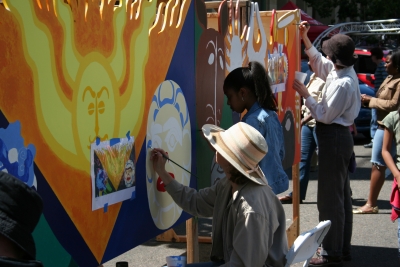
UC Berkeley is launching a new project that aims to reveal hidden place-based histories of race, inequality, and immigration, thanks to a three-year $800,000 grant from The Andrew W. Mellon Foundation for 2020 through 2023. Future Histories Lab will look forward as well as backward, examining urban history with an eye to shaping future urban plans, policies, and community designs.
The project will be led by co-principal investigators Jennifer Wolch, Dean Emerita of the College of Environmental Design and Anthony J. Cascardi, Dean of Arts & Humanities in the College of Letters & Science. The experiential, project-based research and teaching of Future Histories Lab builds upon the past seven years of methodological innovation established through the Global Urban Humanities Initiative, also supported by the Mellon Foundation.
“At a time when issues of race and inequality are at the forefront of public discourse, environmental designers need insights from humanistic disciplines including history and literature. Our project will bring together research methods and modes of representation from a wide variety of departments and professional realms,” said Wolch.
“And humanists likewise need to learn from urbanists and environmental designers how the study of societies and their histories can be brought to bear on the contemporary world,” Cascardi added.
As part of Future Histories Lab, graduate and undergraduate students will conduct archival and fieldwork-based research and experiment with ways to share previously untold histories by creating physical memorials, performances, walking tours, maps, and public online archives, as well as design and planning proposals.
Susan Moffat, Executive Director of the Global Urban Humanities Initiative, will serve as Creative Director of Future Histories Lab.
“We all walk past important sites of traumatic and inspiring events every day without knowing the history of what happened at that very spot. This project will help create public narratives that give communities a better knowledge base for problem-solving,” said Moffat.
For example, a nondescript building on gritty San Pablo Avenue in Berkeley was once home to the Pacific Center, a nationally important site in LGBTQ history. And a red tile-roofed building in central Berkeley that now houses a mental health facility was home to the Rainbow Sign, where Black luminaries including Nina Simone, Alex Haley, and Betye Saar gathered in the 1970s.
These are just two of many sites illuminated by students who have expanded “The Berkeley Revolution” website with the support of the Global Urban Humanities Initiative. The site was created by Professor of English Scott Saul, who will be part of the Future Histories Lab team, with contributions from Professor of Architecture Greg Castillo, who co-taught a project-based course on Bay Area history with Saul.
Interdisciplinary Future Histories Lab courses will be taught by faculty from diverse disciplines that may include architecture, art history, anthropology, city planning, ethnic studies, film, geography, history, landscape architecture, literature, music, performance studies, rhetoric, and art practice. Students will continue to participate in the undergraduate and graduate Certificate programs in Global Urban Humanities, while conducting research focused on the Bay Area.
Students and faculty will work collaboratively with community organizations to create work products that meet identified neighborhood needs, such as cultural resources maps, community archives, oral histories, art installations, exhibits, and neighborhood design interventions.
An online Community Portal will make it easier for community organizations to find university resources and connect with faculty researching areas related to their needs.
Core courses will be structured as “humanities studios,” drawing on the hands-on, iterative traditions of studio education but adapted so that students from outside the design disciplines can fully participate.
The grant supports three years of activities including spring, summer, and fall classes, community partnerships, and the creation of long-lasting archives and stories. The grant also supports the creation of a book about theories and methods of teaching urban humanities.
In spring 2021, the program will offer a graduate studio course that will use art, mapping, and policy analysis to examine the experiences of people as they return to their neighborhoods after incarceration. And an undergraduate studio will use augmented reality as a way to see history in the present built and natural landscape.
Past projects from the Global Urban Humanities Initiative will be models for the future work of the Future Histories Lab. For example, students have created “paper monuments” of graphically striking posters highlighting forgotten individuals and places in New Orleans as proposals to replace Confederate monuments. Students in Global Urban Humanities studio courses have also created performances and installations along the U.S.-Mexico borderwall and at a landfill on San Francisco Bay with a history of encampments of unhoused people.
